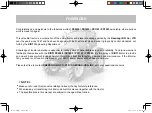
INTRODUCTION
Foams – Polyurethane
See fire. Used for soundproofing. Cured foams used in seat cushions and finishes. Follow the manufacturer’s in-
structions.
Components that have not reacted are irritants and could be harmful to the eyes and the skin. Wear sleeves and
protective goggles. Individuals with chronic respiratory illnesses, asthma, bronchial problems, or a history of allergic
illnesses must not work with or be in proximity to uncured materials.
Components, fumes, and aerosol clouds can cause irritation and sensitization reactions, and may be toxic or harmful.
You must apply these materials with adequate respiratory protection and adequate ventilation. Do not remove the
respirator when you have finished spraying. Keep the respirator on until the fumes and clouds disperse.
Burning uncured components and cured foams can generate toxic and harmful fumes. Do not permit smoking, the
presence of naked flames, or the use of electrical equipment during the application of foam, and until the fumes/
clouds have dispersed. The hot cutting of cured or partially cured foam must be performed in an environment with a
ventilation system with extraction.
Kerosene (Paraffin)
Ingesting kerosene can cause irritation to the mouth and throat. The greatest danger from ingesting kerosene is the
possibility of breathing it into the lungs. Liquid contact dries the skin and can cause irritation or dermatitis. Splashes
on the skin and in the eyes cause mild irritation.
Avoid contact with the eyes and the skin as far as possible and ensure that there is adequate ventilation.
Fuel oil (diesel fuel)
When the quantities are large or the exposure period is long, skin contact with fuel oils with a high boiling point can
cause serious skin diseases, including skin cancer.
Gas cylinders
See fire. In general, gases, such as oxygen, carbon dioxide, argon, and propane, are stored in cylinders with pres-
sures of up to
140 bar
(
2000 lb/in2
). You need to take sufficient care when handling them to prevent physical damage
to the cylinders and the valve accessories. The content of each cylinder must be clearly identified with suitable labels.
You must store the cylinders in a well-ventilated room, protected from ice, rain, and direct sunlight. You must not store
combustible gases near to oxygen cylinders.
Be careful to prevent leaks from the cylinders and the gas lines, and to avoid ignition sources. Only qualified personnel
may perform services using the cylinders.
General workshop equipment and tools
You must keep all equipment and tools in good condition and you must use the correct safety equipment whenever
necessary.
Never use tools or equipment for any purpose other than that for which they are intended. Never overload equipment
such as hoists, jacks, chassis bases and axles, or hoisting slings. The damage caused by overloading does not
always appear immediately and could cause a fatal accident the next time that the equipment is used.
Do not use faulty or damaged equipment or tools, particularly high-speed equipment, such as emery wheels. A dam-
aged emery wheel can disintegrate suddenly and cause serious injury. Use protective goggles whenever you use
equipment for grinding, cutting, polishing, or sandblasting.
Oil test equipment, lubrication test equipment, and high-pressure air test equipment, in
accordance with local legislation
Always keep high-pressure equipment in good condition and carry out regular maintenance, particularly on connec-
tions and fittings. Never point a high-pressure nozzle at the skin as the fluid can cause serious injuries.
47793462 14/03/2017
16
















































